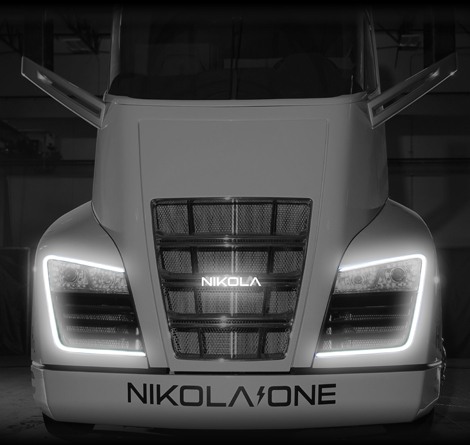Nikola Announces Preliminary Results of Battery Investigations, Voluntarily Recalls 209 Class 8 Battery-Electric Trucks
Hydrogen fuel cell electric truck launch unaffected, in production now with deliveries slated in Q3
The safety of customers, dealers and team members are Nikola’s top priority. Nikola Corporation (Nasdaq: NKLA), a global leader in zero-emissions transportation and energy supply and infrastructure solutions, via the HYLA brand, today provides the preliminary results of its battery pack investigations and as a precautionary measure, announces a voluntary recall of approximately 209 Class 8 Tre battery-electric vehicles (BEVs). Nikola is currently in the process of filing this voluntary recall with the National Highway Traffic Safety Administration (NHTSA) and is placing a temporary hold on new BEV sales until a resolution is in place.
These actions do not affect the hydrogen fuel cell electric vehicle (FCEV) currently in production as the truck’s battery pack has a different design.
Following an August 10 presentation of preliminary findings from Exponent, a reputable third-party investigator, a coolant leak inside a single battery pack was found to be the probable cause of the truck fire at the company’s headquarters in Phoenix, Ariz. on June 23, 2023. The findings were further corroborated by a minor thermal incident that impacted one pack on an engineering validation truck parked at the company’s Coolidge, Ariz. plant on Aug. 10. No one was injured in either incident.
Internal investigations from Nikola’s safety and engineering teams indicate a single supplier component within the battery pack as the likely source of the coolant leak and efforts are underway to provide a field remedy in the coming weeks.
Tre BEV trucks may remain in operation, but for optimal performance and safety, the Nikola team encourages all customers and dealers to immediately take the following actions:
- Place the Main Battery Disconnect (MBD) switch into the “ON” position at all times to enable real-time vehicle monitoring and safety systems operation
- Consider parking trucks outside to allow for over-the-air updates and better connectivity with Fleet Command, Nikola’s truck monitoring system
The company’s software systems are being used in real-time to monitor trucks in the field closely and continually assess risks. Thus far, only two (2) battery packs have experienced a thermal event, out of more than 3,100 packs on trucks produced to date (less than 0.07%).
Additional information, updates and required customer actions will be announced in the coming weeks.
“At Nikola we take safety very seriously,” said Steve Girsky, Nikola’s CEO. “We stated from the beginning that as soon as our investigations were concluded we would provide an update, and we will continue our transparency as we learn more.”
The company’s initial statement on June 23 alluded to foul play as a possible cause of the incident, based on video footage showing a vehicle parked next to the impacted trucks and quickly pulling away after a bright flash and the commencement of the fire. Extensive internal and third party-led hypothesis testing, employee and contractor interviews, and hours of video footage review has since suggested foul play or other external factors were unlikely to have caused the incident.
Nikola Truck Safety
Prior to putting the Tre BEV into production, Nikola spent significant time validating the truck for the safety of the driver and their surroundings. The truck meets and exceeds FMVSS and UN GTR 20 government regulations; was subjected to front, side, rear, and rollover crash testing; and satisfied battery safety elements including vehicle resistance isolation monitoring, water fording resistance, battery coolant leakage monitoring, battery thermal runaway detection, and high-voltage interlock loop fault detection. Battery system safety was tested and validated, including single cell passive propagation resistance (PPR), vibration and mechanical integrity, thermal shock and cycling, fire resistance, external short circuit, and battery management system overcharge, over-discharge, overcurrent, and extreme temperature testing.
Category: Cab, Trailer & Body, Electric Vehicles, Engines & Drivetrains, Equipment, Featured, Fuel & Oil, General Update, Green, News, Products, Safety, Vehicles











